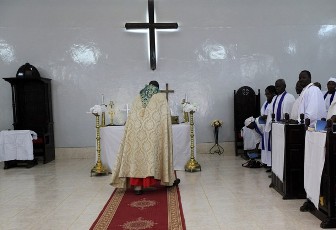South Sudanese Christians plan “prophesied” pilgrimage to Israel
February 24, 2012 (JUBA) – Christians in South Sudan are planning a pilgrimage to Israel in fulfillment of what they say was God’s promise in the Bible to the people of the region, senior Church leaders have announced.

If it goes ahead, the pilgrimage will see see hundreds of South Sudanese Christians, particularly senior church leaders, traveling to the Holy Land and presenting gifts on Mount Zion in the next few months.
According to a statement from the Vice President’s Press Secretary, James Gatdet Dak, the Church leaders in the meeting explained to Machar the significance of the pilgrimage which they said was promised by God in the Bible by the Prophet Isaiah more than 3,000 years ago.
The Church leaders presented their case based on Isaiah Chapter 18, with the title “God Will Punish Sudan” according to the ‘Good News Bible’ translation from Hebrew into English or “Prophecy Against Cush” according to the ‘New International Version.’
Many South Sudanese Christians believe that verse 3 of Isaiah 18 refers to South Sudan: “All you people of the world, you who live on the earth, when a banner is raised on the mountains, you will see it, and when a trumpet sounds, you will hear it.”
The prophecy continues in verse 7: “At that time gifts will be brought to the Lord Almighty from a people tall and smooth-skinned, from a people feared far and wide, an aggressive nation of strange speech, whose land is divided by rivers – the gifts will be brought to Mount Zion, the place of the Name of the Lord Almighty.”
The spiritual leaders told the Vice President that the independence of South Sudan, on 9 July 2011 as part of a peace deal with north Sudan, was foreseen and promised by God.
They argued that the raising of the “banner” refers to the South Sudanese flag being raised, signalling the country becoming the world’s newest country. South Sudan is the 193rd member of the United Nations and Africa’s 54th country.
The Church leaders said that the blowing of the “trumpet” was also fulfilled by the singing of South Sudan’s national anthem, which was created last year.
As the whole world was able to watch the historic event on television and through the media, the religious leaders said that this also completed the prophecy in Isaiah that the “whole world” would witness the event.
South Sudan’s independence came after decades of conflict since the end of Anglo-Egyptian rule in 1956.
The attempted imposition of Islamic Shari’a Law on South Sudan, was one of the many triggers for Sudan’s second civil war, which between 1983 and 2005 resulted in the deaths of around two million people.
However, to view the conflict as a religious one is misleading to most historians as it neglects to consider a host of other factors; the historical economic and political marginalisation of South Sudan; the “African” south’s resistance to Arabisation; the failure to implement a previous peace deal; and disputes over the division of resources including Nile water and latterly oil; to name a few.
South Sudan is a multireligious society with a large number of the population following traditional African belief systems, as well as Christianity and Islam. The new government of South Sudan, says it has, adopted a policy of religious freedom and tolerance.
Despite the fact that over 95% of South Sudan’s top leadership are Christians, the government says it encourages Muslims to freely carryout their pilgrimages to Islamic Holy places, such as Mecca in Saudi Arabia.
The government also organised a historical event two years ago to receive a nearly 150 year old rod or ‘dang’ of a leading South Sudanese traditional spiritual leader from the Nuer tribe, popularly known as Prophet Ngundeng Bong.
The Nuer believe that Ngundeng, who died in 1906, predicted South Sudan’s wars with various Khartoum governments and the country’s eventual independence.
His ‘dang’ was stolen by the British colonial administration in 1928 22 years after his death at his headquarters in what is now Jonglei state. It was returned to South Sudan on 16 May 2009.
The Church leaders discussed with the Vice President the type of gifts that could be selected and taken to the Mount Zion and requested that government finance the transportation of the pilgrims to Israel.
South Sudan has vowed to establish an embassy in Jerusalem and not Tel Aviv. Its relations with Israel have angered north Sudan and some other members of the Arab League, which blame Israel for aiding the break up of one their members.
Despite its largely African identity South Sudan has the option to join the Arab League because it seceded from a Sudan, a member of the ethnically based organisation.
(ST)

